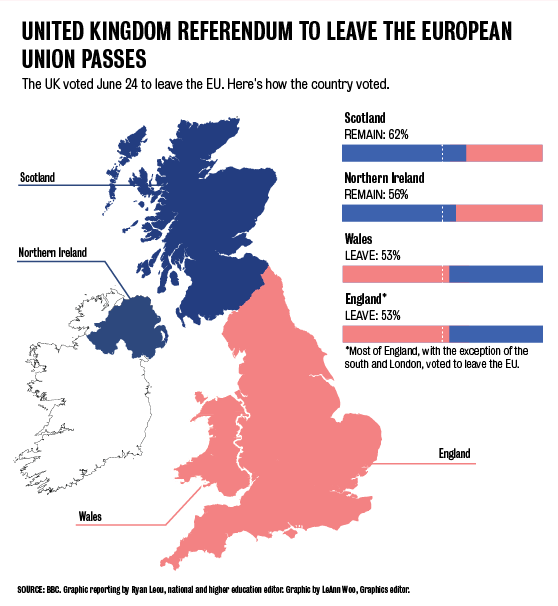Professors, students weigh in on Brexit’s effect on UCLA

By Ryan Leou
July 4, 2016 3:02 a.m.
University of California students in the United Kingdom saw firsthand the country’s split reaction to the European Union referendum after the vote June 24.
About 52 percent of U.K. voters voted to leave the European Union on June 23.
After the vote, financial markets lost almost $2 trillion and the pound fell to its lowest value against the dollar in 30 years, according to the Guardian. In the week since the vote, markets rebounded slightly and the pound regained some of its value.
The effects from the British exit from the EU, or Brexit, are most likely short-lived, said Michael Storper, director of Global Public Affairs at the Luskin School of Public Affairs.
Students from UCLA studying in the U.K. said they felt free to spend more because they could get more pounds in exchange for dollars immediately after the Brexit vote.
Annie Lu, a rising third-year business economics student studying abroad in London, said she has not exchanged currency after the drop in value, but stretched her dollar by using her credit card for purchases.
Some currency exchanges or banks shut down the day after the vote due to the rapid fluctuations in exchange rates, though most reopened the weekend after the vote.
Ronald Rogowski, a political science professor researching international trade, said if the U.K. leaves the EU, it would have to negotiate new trade agreements with countries trading with the EU.
The U.K. National Police Chiefs’ Council also reported more incidents of hate crimes and racist speech after the vote.
Dominic Thomas, chair of the French and francophone studies department and an EU expert, said he thinks the increase in hate crimes can be directly attributed to the Leave campaign. He said he thinks the campaign focused on the threats posed by global migration, characterizing migrants as burdens on schools and the healthcare system.
“Those in the Brexit camp encouraged the kind of overt racism we are now witnessing,” Thomas said. “Some Brexit supporters clearly believe that their victory in the referendum somehow justifies (and) legitimates their behavior and actions.”
Storper said while the country has already voted to leave, the actual process of withdrawing from the EU could take as long as two years to negotiate. In the meantime, because the U.K. and EU will have to negotiate everything about their new relationship, including tariffs, migration and trade, it’s unclear what will happen.
According to the BBC, the majority of young people and the populations of Scotland, Northern Ireland and London, voted to stay in the EU.

Storper said he thinks Northern Ireland and Scotland have always had a closer connection to the European continent than to the United Kingdom, because the English were historically seen as conquerors.
In 2014, Scotland voted against independence. One of the major arguments for them remaining in the U.K. was guaranteed access to the EU. Storper added now it looks like the U.K. will break its promise.
Thomas said he thinks young adults voted to stay in the EU because they are more globalized, open-minded and are benefiting from international education, which the EU promotes.
Ariana Wang, a rising third-year business economics student studying abroad in London, said she saw the largely negative public reaction to the results of the vote on a trip to Edinburgh, Scotland last weekend.
“We saw people holding vigils (calling for Scottish independence) in response to the referendum,” Wang said. “My Airbnb host was very upset about the vote, especially now that he (might not be able to) travel freely through EU countries .”
Some EU students and residents said they are worried they might need visas to travel to the U.K. in the future.
Rogowski said one of his students from the Czech Republic planned to study economics in London, but decided to study in Germany instead because of the vote.
Storper, who teaches globalization at The London School of Economics and Political Science every fall, said he commutes from Paris without need for a permit because he has a French passport. When the U.K. officially leaves the EU, he may have to apply for a work permit, which the U.K. could deny.
Storper added he thinks an indirect effect of the vote could be a decrease in students from the EU to the U.K., from which he thinks students from the U.S. benefit.
“As an American, you can get not only contact with British students but other Europeans as well, and that could change: It could become (even) more British,” Storper said.
Filippo Comin, a second-year economics and management student studying in London from Italy, said he thinks if the U.K. leaves the EU, tuition for non-British citizens could rise and cause fewer students from EU countries to study in the U.K.
“Today, European citizens pay the university (as much as) a U.K. citizen,” Comin said. “With Brexit, we’ll pay much more. I think many students will look for other top universities in Holland, Denmark or somewhere else in northern Europe.”


